Boyle J.A. The Cambridge History of Iran, Volume 5: The Saljuq and Mongol Periods
Подождите немного. Документ загружается.

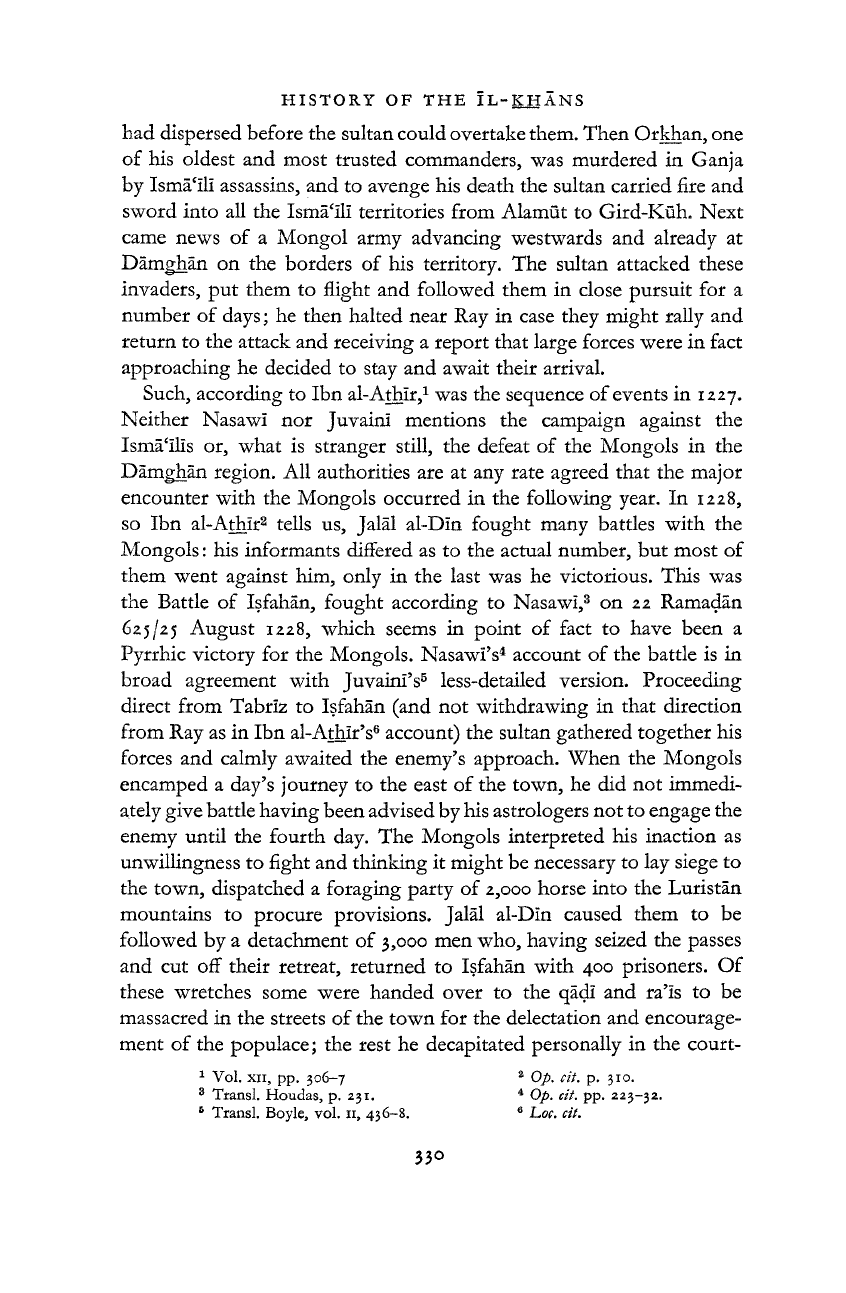
HISTORY OF THE IL-KHANS
had dispersed before the sultan could overtake them. Then Orkhan, one
of his oldest and most trusted commanders, was murdered in Ganja
by Isma'ili assassins, and to avenge his death the sultan carried fire and
sword into all the Isma'Ili territories from Alamut to Gird-Kuh. Next
came news of a Mongol army advancing westwards and already at
Damghan on the borders of his territory. The sultan attacked these
invaders, put them to flight and followed them in close pursuit for a
number of days; he then halted near Ray in case they might rally and
return to the attack and receiving a report that large forces were in fact
approaching he decided to stay and await their arrival.
Such, according to Ibn al-Athir,
1
was the sequence of events in
1227.
Neither Nasawi nor Juvaini mentions the campaign against the
Isma'llls or, what is stranger still, the defeat of the Mongols in the
Damghan region. All authorities are at any rate agreed that the major
encounter with the Mongols occurred in the following year. In
1228,
so Ibn al-Athir
2
tells us, Jalal al-Dln fought many battles with the
Mongols: his informants differed as to the actual number, but most of
them went against him, only in the last was he victorious. This was
the Battle of Isfahan, fought according to Nasawi,
3
on 22 Ramadan
625/25 August 1228, which seems in point of fact to have been a
Pyrrhic victory for the Mongols. Nasawi's
4
account of the battle is in
broad agreement with Juvaini's
5
less-detailed version. Proceeding
direct from Tabriz to Isfahan (and not withdrawing in that direction
from Ray as in Ibn al-Athir's
6
account) the sultan gathered together his
forces and calmly awaited the enemy's approach. When the Mongols
encamped a day's journey to the east of the town, he did not immedi-
ately give battle having been advised by his astrologers not to engage the
enemy until the fourth day. The Mongols interpreted his inaction as
unwillingness to fight and thinking it might be necessary to lay siege to
the town, dispatched a foraging party of 2,000 horse into the Luristan
mountains to procure provisions. Jalal al-Dln caused them to be
followed by a detachment of 3,000 men who, having seized the passes
and cut off their retreat, returned to Isfahan with
400
prisoners. Of
these wretches some were handed over to the qadi and ra'is to be
massacred in the streets of the town for the delectation and encourage-
ment of the populace; the rest he decapitated personally in the court-
1
Vol.
XII,
pp. 306-7
3
Transi. Houdas, p. 231.
5
Transi. Boyle, vol. 11, 436-8.
2
Op. cit. p. 310.
4
Op. cit. pp. 223-32.
6
Loc. cit.
330
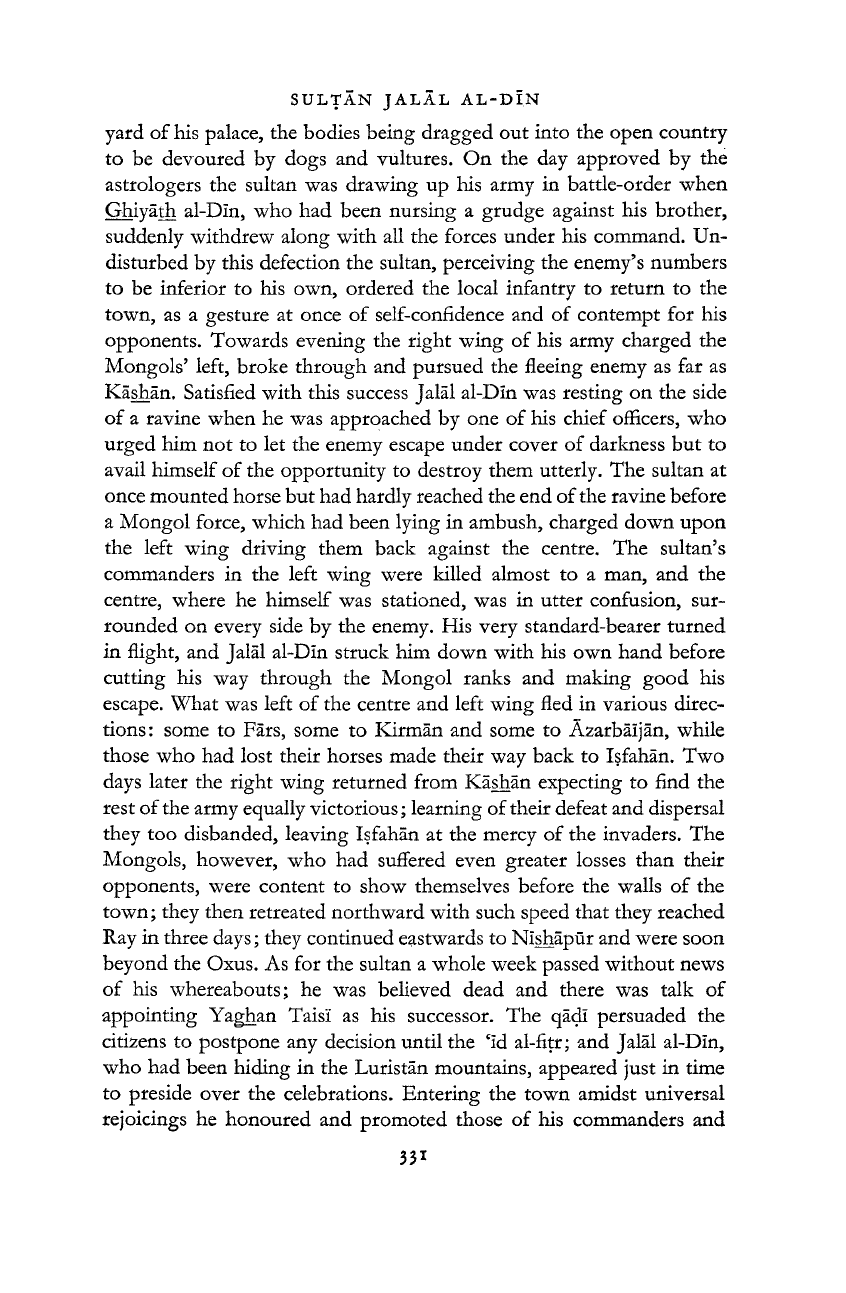
SULTAN JALAL AL-DIN
331
yard of his palace, the bodies being dragged out into the open country
to be devoured by dogs and vultures. On the day approved by the
astrologers the sultan was drawing up his army in battle-order when
Ghiyath al-Dln, who had been nursing a grudge against his brother,
suddenly withdrew along with all the forces under his command. Un-
disturbed by this defection the sultan, perceiving the enemy's numbers
to be inferior to his own, ordered the local infantry to return to the
town, as a gesture at once of self-confidence and of contempt for his
opponents. Towards evening the right wing of his army charged the
Mongols' left, broke through and pursued the fleeing enemy as far as
Kashan. Satisfied with this success Jalal al-Dln was resting on the side
of a ravine when he was approached by one of his chief officers, who
urged him not to let the enemy escape under cover of darkness but to
avail himself of the opportunity to destroy them utterly. The sultan at
once mounted horse but had hardly reached the end of the ravine before
a Mongol force, which had been lying in ambush, charged down upon
the left wing driving them back against the centre. The sultan's
commanders in the left wing were killed almost to a man, and the
centre,
where he himself was stationed, was in utter confusion, sur-
rounded on every side by the enemy. His very standard-bearer turned
in flight, and Jalal al-Dln struck him down with his own hand before
cutting his way through the Mongol ranks and making good his
escape.
What was left of the centre and left wing fled in various direc-
tions : some to Fars, some to Kirman and some to Azarbaijan, while
those who had lost their horses made their way back to Isfahan. Two
days later the right wing returned from Kashan expecting to find the
rest of the army equally victorious; learning of their defeat and dispersal
they too disbanded, leaving Isfahan at the mercy of the invaders. The
Mongols, however, who had suffered even greater losses than their
opponents, were content to show themselves before the walls of the
town; they then retreated northward with such speed that they reached
Ray in three days; they continued eastwards to Nishapur and were soon
beyond the Oxus. As for the sultan a whole week passed without news
of his whereabouts; he was believed dead and there was talk of
appointing Yaghan Taisi' as his successor. The qadi persuaded the
citizens to postpone any decision until the 'Id al-fitr; and Jalal al-Dln,
who had been hiding in the Luristan mountains, appeared just in time
to preside over the celebrations. Entering the town amidst universal
rejoicings he honoured and promoted those of his commanders and
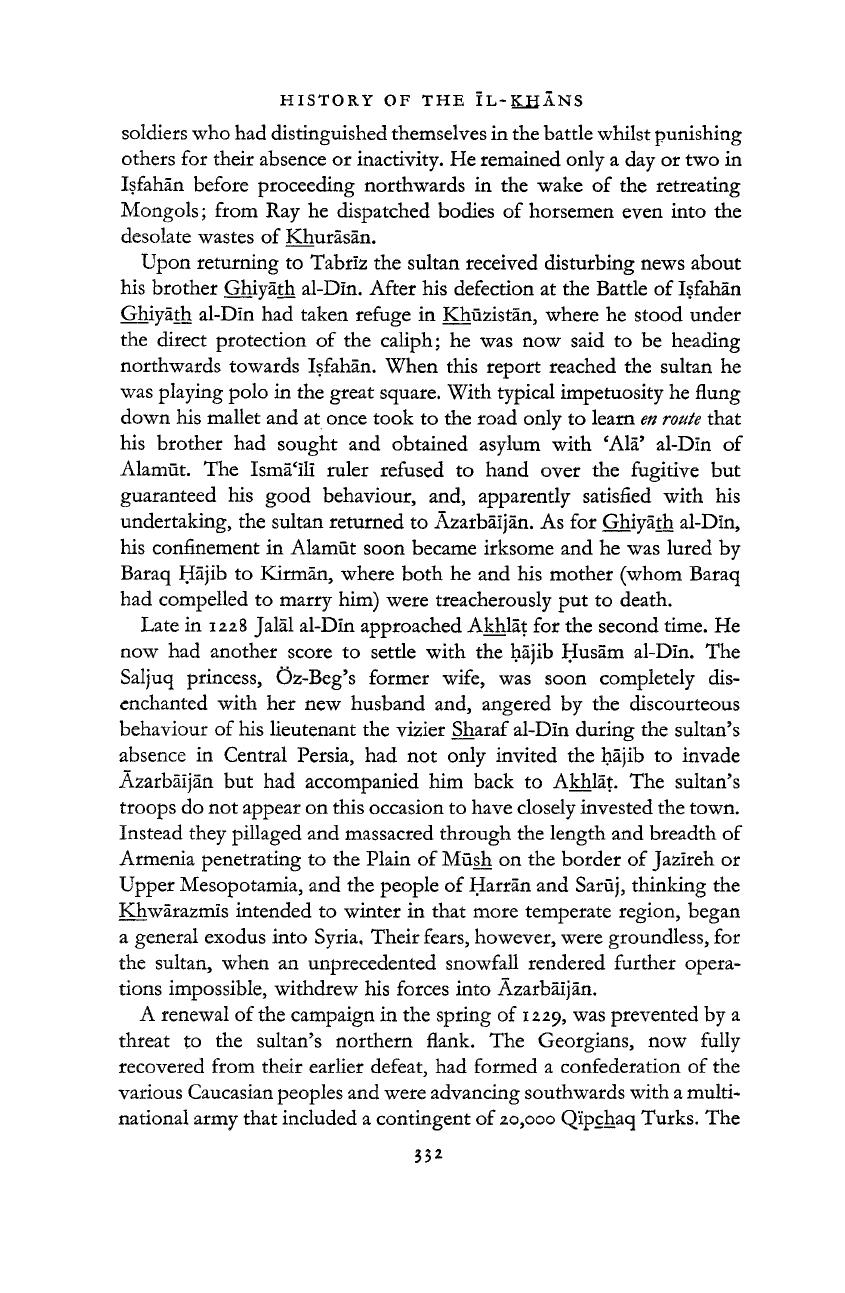
HISTORY OF THE IL-KHANS
332
soldiers who had distinguished themselves in the battle whilst punishing
others for their absence or inactivity. He remained only a day or two in
Isfahan before proceeding northwards in the wake of the retreating
Mongols; from Ray he dispatched bodies of horsemen even into the
desolate wastes of Khurasan.
Upon returning to Tabriz the sultan received disturbing news about
his brother Ghiyath al-Dln. After his defection at the Battle of Isfahan
Ghiyath al-Din had taken refuge in Khuzistan, where he stood under
the direct protection of the caliph; he was now said to be heading
northwards towards Isfahan. When this report reached the sultan he
was playing polo in the great square. With typical impetuosity he flung
down his mallet and at once took to the road only to learn en route that
his brother had sought and obtained asylum with 'Ala' al-Din of
Alamut. The Isma'Ili ruler refused to hand over the fugitive but
guaranteed his good behaviour, and, apparently satisfied with his
undertaking, the sultan returned to Azarbaijan. As for Ghiyath al-Din,
his confinement in Alamut soon became irksome and he was lured by
Baraq Hajib to Kirman, where both he and his mother (whom Baraq
had compelled to marry him) were treacherously put to death.
Late in
1228
Jalal al-Din approached Akhlat for the second time. He
now had another score to settle with the hajib Husam al-Din. The
Saljuq princess, Oz-Beg's former wife, was soon completely dis-
enchanted with her new husband and, angered by the discourteous
behaviour of his lieutenant the vizier Sharaf al-Din during the sultan's
absence in Central Persia, had not only invited the hajib to invade
Azarbaijan but had accompanied him back to Akhlat. The sultan's
troops do not appear on this occasion to have closely invested the town.
Instead they pillaged and massacred through the length and breadth of
Armenia penetrating to the Plain of Mush on the border of Jazireh or
Upper Mesopotamia, and the people of Harran and Sariij, thinking the
Khwarazmis intended to winter in that more temperate region, began
a general exodus into Syria. Their fears, however, were groundless, for
the sultan, when an unprecedented snowfall rendered further opera-
tions impossible, withdrew his forces into Azarbaijan.
A renewal of the campaign in the spring of
1229,
was prevented by a
threat to the sultan's northern flank. The Georgians, now fully
recovered from their earlier defeat, had formed a confederation of the
various Caucasian peoples and were advancing southwards with a multi-
national army that included a contingent of
20,000 Qipchaq Turks. The
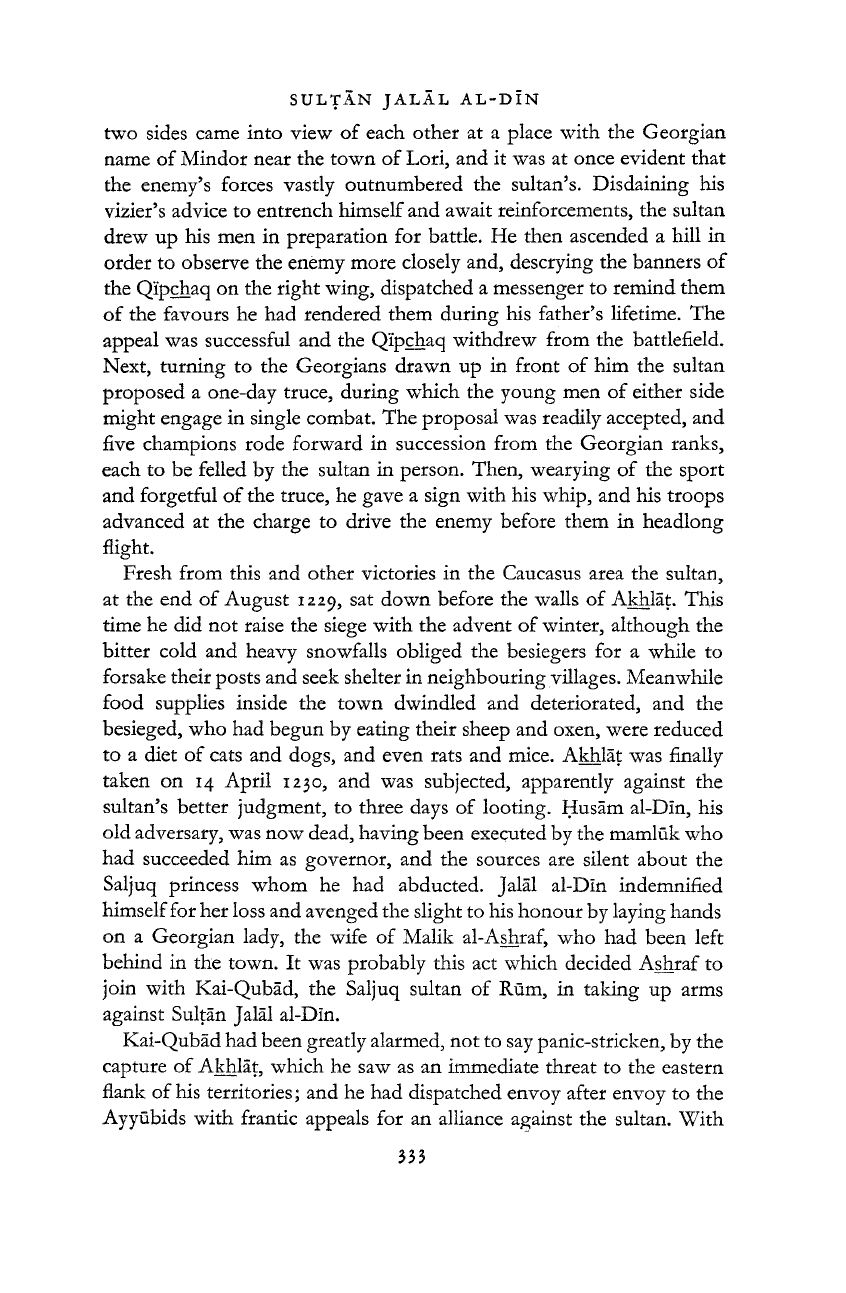
SULTAN JALAL AL-DIN
333
two sides came into view of each other at a place with the Georgian
name of Mindor near the town of Lori, and it was at once evident that
the enemy's forces vastly outnumbered the sultan's. Disdaining his
vizier's advice to entrench himself and await reinforcements, the sultan
drew up his men in preparation for battle. He then ascended a hill in
order to observe the enemy more closely and, descrying the banners of
the Qipchaq on the right wing, dispatched a messenger to remind them
of the favours he had rendered them during his father's lifetime. The
appeal was successful and the Qipchaq withdrew from the battlefield.
Next, turning to the Georgians drawn up in front of him the sultan
proposed a one-day truce, during which the young men of either side
might engage in single combat. The proposal was readily accepted, and
five champions rode forward in succession from the Georgian ranks,
each to be felled by the sultan in person. Then, wearying of the sport
and forgetful of the truce, he gave a sign with his whip, and his troops
advanced at the charge to drive the enemy before them in headlong
flight.
Fresh from this and other victories in the Caucasus area the sultan,
at the end of August
1229,
sat down before the walls of Akhlat. This
time he did not raise the siege with the advent of winter, although the
bitter cold and heavy snowfalls obliged the besiegers for a while to
forsake their posts and seek shelter in neighbouring villages. Meanwhile
food supplies inside the town dwindled and deteriorated, and the
besieged, who had begun by eating their sheep and oxen, were reduced
to a diet of cats and dogs, and even rats and mice. Akhlat was finally
taken on 14 April
1230,
and was subjected, apparently against the
sultan's better judgment, to three days of looting. Husam al-Dln, his
old adversary, was now dead, having been executed by the mamluk who
had succeeded him as governor, and the sources are silent about the
Saljuq princess whom he had abducted. Jalal al-Dln indemnified
himself for her loss and avenged the slight to his honour by laying hands
on a Georgian lady, the wife of Malik al-Ashraf, who had been left
behind in the town. It was probably this act which decided Ashraf to
join with Kai-Qubad, the Saljuq sultan of Rum, in taking up arms
against Sultan Jalal al-Dln.
Kai-Qubad had been greatly alarmed, not to say panic-stricken, by the
capture of Akhlat, which he saw as an immediate threat to the eastern
flank of his territories; and he had dispatched envoy after envoy to the
Ayyubids with frantic appeals for an alliance against the sultan. With
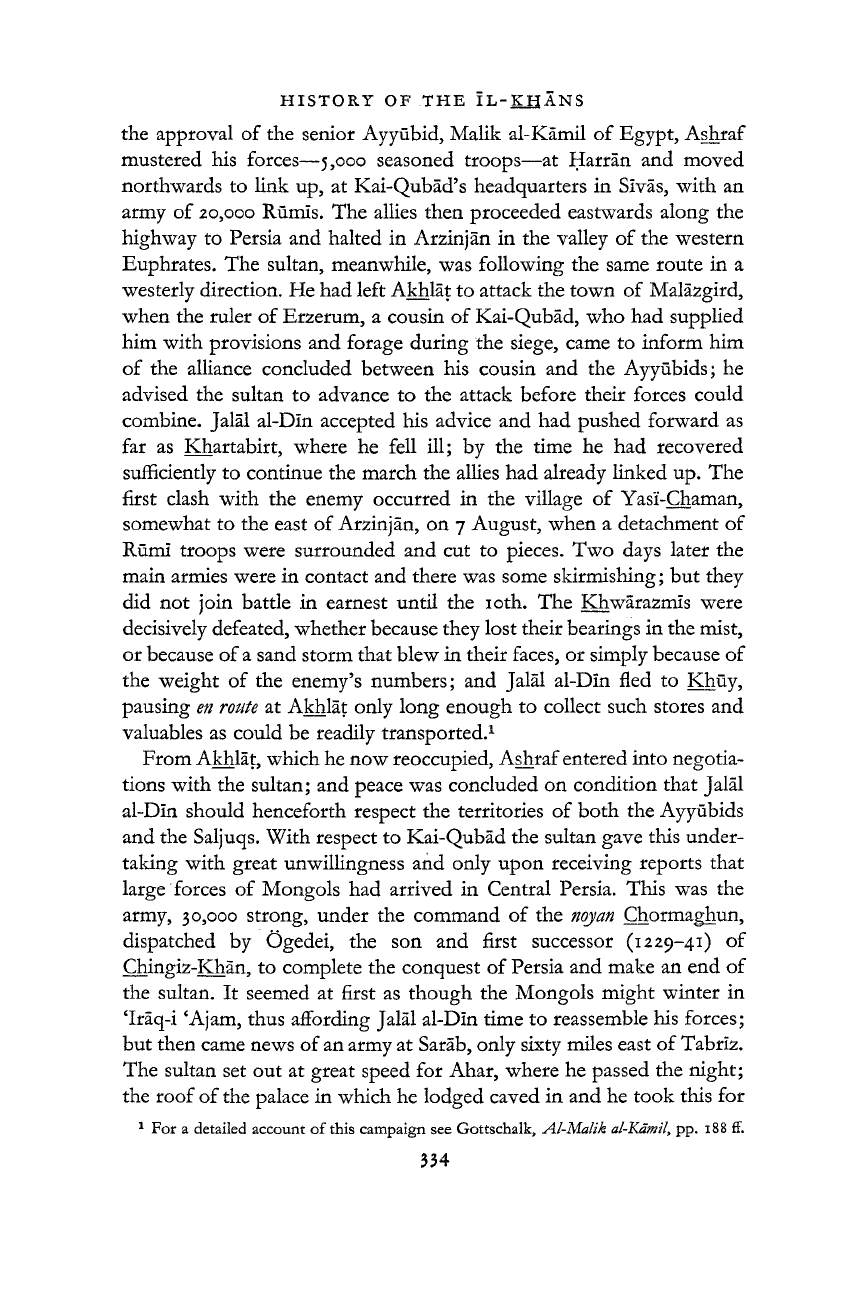
HISTORY
OF THE IL-KHANS
334
the approval of the senior Ayyiibid, Malik al-Kamil of Egypt, Ashraf
mustered his
forces—5,000
seasoned troops—at Harran and moved
northwards to link up, at Kai-Qubad's headquarters in Sivas, with an
army of
20,000 Rumis. The allies then proceeded eastwards along the
highway to Persia and halted in Arzinjan in the valley of the western
Euphrates. The sultan, meanwhile, was following the same route in a
westerly direction. He had left Akhlat to attack the town of Malazgird,
when the ruler of Erzerum, a cousin of Kai-Qubad, who had supplied
him with provisions and forage during the siege, came to inform him
of the alliance concluded between his cousin and the Ayyubids; he
advised the sultan to advance to the attack before their forces could
combine. Jalal al-Dln accepted his advice and had pushed forward as
far as Khartabirt, where he fell ill; by the time he had recovered
sufficiently to continue the march the allies had already linked up. The
first clash with the enemy occurred in the village of Yasi-Chaman,
somewhat to the east of Arzinjan, on 7 August, when a detachment of
Rumi troops were surrounded and cut to pieces. Two days later the
main armies were in contact and there was some skirmishing; but they
did not join battle in earnest until the
10th.
The Khwarazmis were
decisively defeated, whether because they lost their bearings in the mist,
or because of a sand storm that blew in their faces, or simply because of
the weight of the enemy's numbers; and Jalal al-Dln fled to Khuy,
pausing en route at Akhlat only long enough to collect such stores and
valuables as could be readily transported.
1
From Akhlat, which he now reoccupied, Ashraf entered into negotia-
tions with the sultan; and peace was concluded on condition that Jalal
al-Dln should henceforth respect the territories of both the Ayyubids
and the Saljuqs. With respect to Kai-Qubad the sultan gave this under-
taking with great unwillingness and only upon receiving reports that
large forces of Mongols had arrived in Central Persia. This was the
army,
30,000 strong, under the command of the noyan Chormaghun,
dispatched by Ogedei, the son and first successor
(1229-41)
of
Chingiz-Khan, to complete the conquest of Persia and make an end of
the sultan. It seemed at first as though the Mongols might winter in
'Iraq-i 'Ajam, thus affording Jalal al-Dln time to reassemble his forces;
but then came news of an army at Sarab, only sixty miles east of Tabriz.
The sultan set out at great speed for Ahar, where he passed the night;
the roof of the palace in which he lodged caved in and he took this for
1
For a detailed account of this campaign see Gottschalk, Al֊Malik al-Kdmil, pp. 188 ff.

SULTAN JALAL AL-DIN
335
an evil omen. He made his way to the Mughan Steppe, where the
Mongols all but caught up with him; he shook them off by abandoning
his encampment under cover of darkness and hiding in the mountains
of Kapan, in what is today the extreme south-east of Soviet Armenia.
The winter of 1230-1 he passed in Urmiyeh and Ushnuyeh; later we
find him in Arran sentencing his vizier Sharaf al-Mulk, justly or un-
justly, to death and suppressing a revolt in Ganja; then involved in
fruitless negotiations with the Ayyubid governor of Akhlat; and finally
en route for Diyarbakr, apparently to join the ruler of Amid in an attack
upon the sultan of Rum. In the middle of August
1231
he encamped in
the immediate vicinity of Amid; he drank heavily that night and was
sunk in intoxicated sleep when, at day break, the Mongols launched
their attack. Roused by one of his generals he effected his escape whilst
the enemy was pursuing the bulk of his army, which, led by the same
general, made its way to Irbil and finally to Isfahan. The sultan, mean-
while,
with only a small following, rode up to the walls of Amid and,
being refused admission, turned back in the direction of Mayyafariqin
and encamped outside a nearby village. Again overtaken by the Mongols
he killed two of his pursuers and made off into the mountains. Here, he
was captured by the Kurds, who murdered him for his clothes and
horse,
according to some authorities, or for motives of revenge,
according to others. In due course the ruler of Amid recovered his
body and gave it burial; but many refused to believe that he was dead
and years later, when the whole of his domains were subject to Mongol
rule,
pretenders would arise claiming to be Sultan Jalal al-Dln.
Such was the end of the last of the Khwarazm-Shahs. Nasawi
1
describes him as a short, dark man, Turkish in appearance and in speech,
though he spoke Persian also. Grave and taciturn by nature he smiled
rather than laughed and never lost his temper or used abusive language.
His qualities, in d'Ohsson's judgment, were those of a Turkmen
warrior rather than of a general or a sovereign. This is to do him less
than justice. For all his faults, he alone of his contemporaries, as was
recognized by friend and foe alike, was a match for the invaders. Jalal
al-Dln and his army formed a wall between Islam and the Tartars. That
wall had now been breached and neither Ayyubid nor Saljuq was
capable of stemming the flood.
1
Transl. Houdas, pp. 411-12.
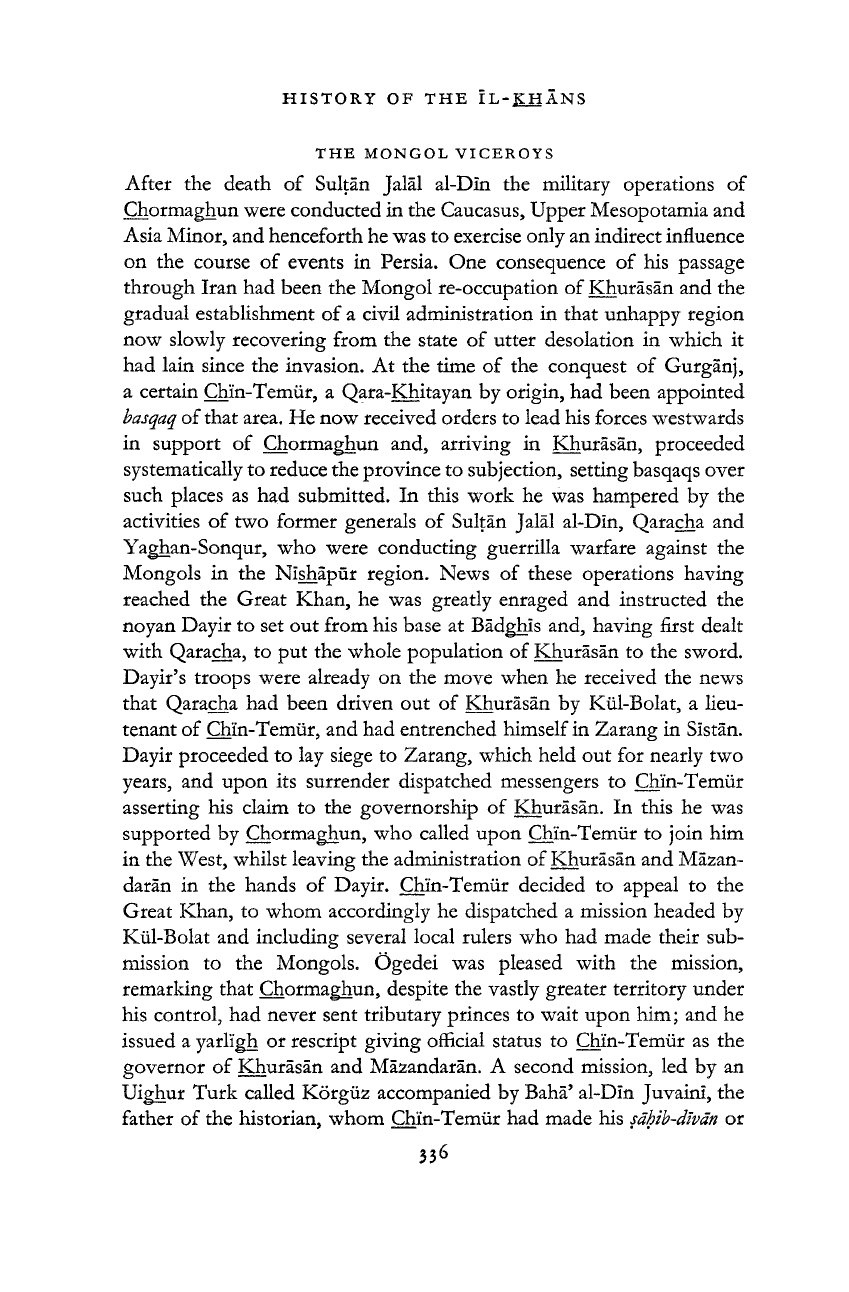
HISTORY OF THE IL-KHANS
THE MONGOL VICEROYS
After the death of Sultan Jalal al-Din the military operations of
Chormaghun were conducted in the Caucasus, Upper Mesopotamia and
Asia Minor, and henceforth he was to exercise only an indirect influence
on the course of events in Persia. One consequence of his passage
through Iran had been the Mongol re-occupation of Khurasan and the
gradual establishment of a civil administration in that unhappy region
now slowly recovering from the state of utter desolation in which it
had lain since the invasion. At the time of the conquest of Gurganj,
a certain Chin-Temur, a Qara-Khitayan by origin, had been appointed
basqaq of that area. He now received orders to lead his forces westwards
in support of Chormaghun and, arriving in Khurasan, proceeded
systematically to reduce the province to subjection, setting basqaqs over
such places as had submitted. In this work he was hampered by the
activities of two former generals of Sultan Jalal al-Din, Qaracha and
Yaghan-Sonqur, who were conducting guerrilla warfare against the
Mongols in the Nishapur region. News of these operations having
reached the Great Khan, he was greatly enraged and instructed the
noyan Dayir to set out from his base at Bad
ghis and, having first dealt
with Qaracha, to put the whole population of Khurasan to the sword.
Dayir's troops were already on the move when he received the news
that Qaracha had been driven out of Khurasan by Kiil-Bolat, a lieu-
tenant of Chin-Temur, and had entrenched himself in Zarang in Sistan.
Dayir proceeded to lay siege to Zarang, which held out for nearly two
years, and upon its surrender dispatched messengers to Chin-Temur
asserting his claim to the governorship of Khurasan. In this he was
supported by Chormaghun, who called upon Chin-Temur to join him
in the West, whilst leaving the administration of Khurasan and Mazan-
daran in the hands of Dayir. Chin-Temur decided to appeal to the
Great Khan, to whom accordingly he dispatched a mission headed by
Kiil-Bolat and including several local rulers who had made their sub-
mission to the Mongols. Ogedei was pleased with the mission,
remarking that Chormaghun, despite the vastly greater territory under
his control, had never sent tributary princes to wait upon him; and he
issued a yarligh or rescript giving official status to Chin-Temur as the
governor of Khurasan and Mazandaran. A second mission, led by an
Uighur Turk called Korgiiz accompanied by Baha' al-Din Juvaini, the
father of the historian, whom Chin-Temiir had made his sahib-divan or
336
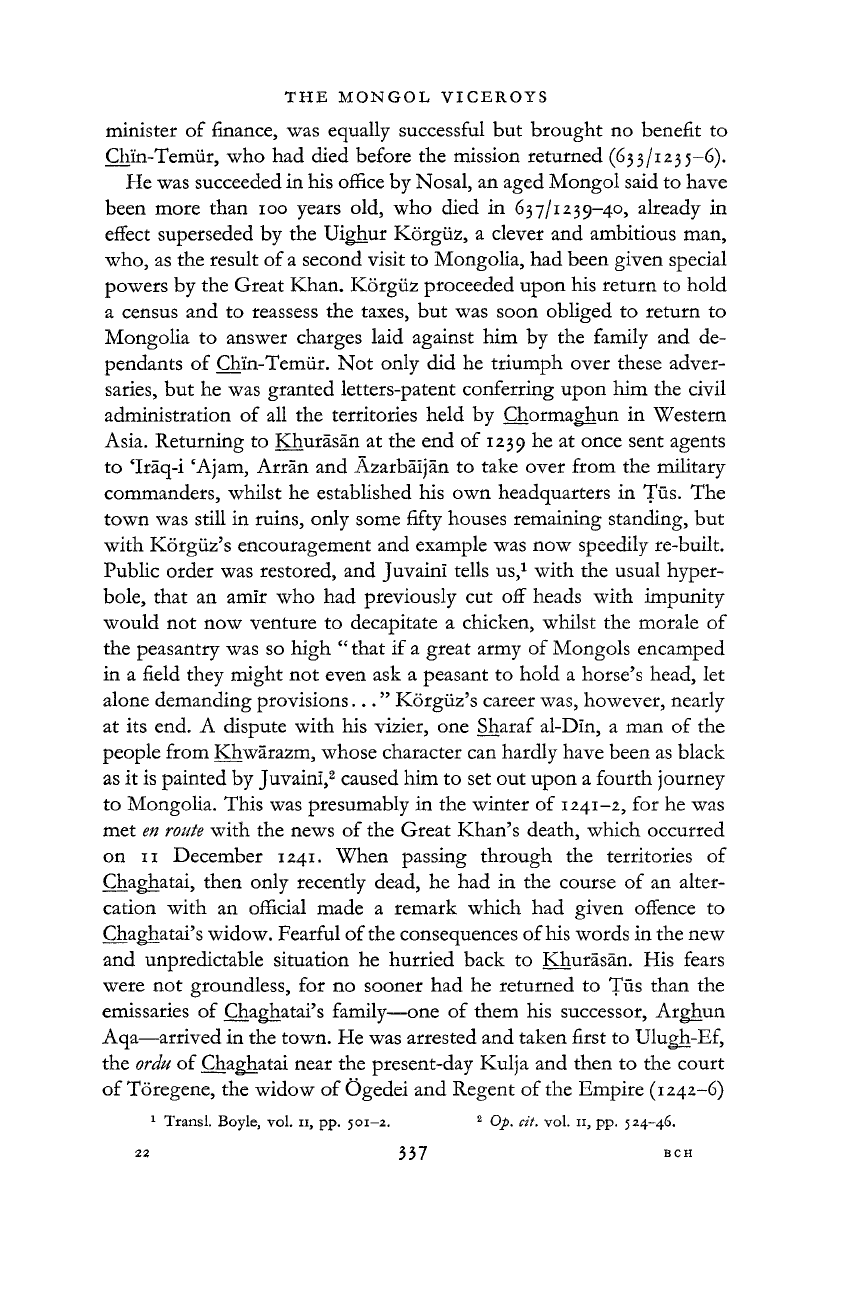
THE MONGOL VICEROYS
minister of finance, was equally successful but brought no benefit to
Chin-Temur, who had died before the mission returned
(633/1235-6).
He was succeeded in his office by Nosal, an aged Mongol said to have
been more than
100
years old, who died in
637/1239-40,
already in
effect superseded by the Ui
ghur Korguz, a clever and ambitious man,
who,
as the result of a second visit to Mongolia, had been given special
powers by the Great Khan. Korgiiz proceeded upon his return to hold
a census and to reassess the taxes, but was soon obliged to return to
Mongolia to answer charges laid against him by the family and de-
pendants of Chin-Temiir. Not only did he triumph over these adver-
saries, but he was granted letters-patent conferring upon him the civil
administration of all the territories held by Chormaghun in Western
Asia. Returning to Khurasan at the end of
1239
he at once sent agents
to 'Iraq-i
c
Ajam, Arran and Azarbaljan to take over from the military
commanders, whilst he established his own headquarters in Tus. The
town was still in ruins, only some fifty houses remaining standing, but
with Korguz's encouragement and example was now speedily re-built.
Public order was restored, and Juvaini tells us,
1
with the usual hyper-
bole,
that an amir who had previously cut off heads with impunity
would not now venture to decapitate a chicken, whilst the morale of
the peasantry was so high " that if a great army of Mongols encamped
in a field they might not even ask a peasant to hold a horse's head, let
alone demanding provisions..." Korguz's career was, however, nearly
at its end. A dispute with his vizier, one Sharaf al-Din, a man of the
people from Khwarazm, whose character can hardly have been as black
as it is painted by Juvaini,
2
caused him to set out upon a fourth journey
to Mongolia. This was presumably in the winter of
1241-2, for he was
met en route with the news of the Great Khan's death, which occurred
on 11 December 1241. When passing through the territories of
Chaghatai, then only recently dead, he had in the course of an alter-
cation with an official made a remark which had given offence to
Chaghatai's widow. Fearful of the consequences of his words in the new
and unpredictable situation he hurried back to Khurasan. His fears
were not groundless, for no sooner had he returned to Tus than the
emissaries of Chaghatai's family—one of them his successor, Arghun
Aqa—arrived in the town. He was arrested and taken first to Ulugh-Ef,
the ordu of Chaghatai near the present-day Kulja and then to the court
of Toregene, the widow of Ogedei and Regent of the Empire
(1242-6)
1
Transi. Boyle, vol. 11, pp. 501-2.
2
Op. cit. vol. 11, pp. 524-46.
22 337 BCH
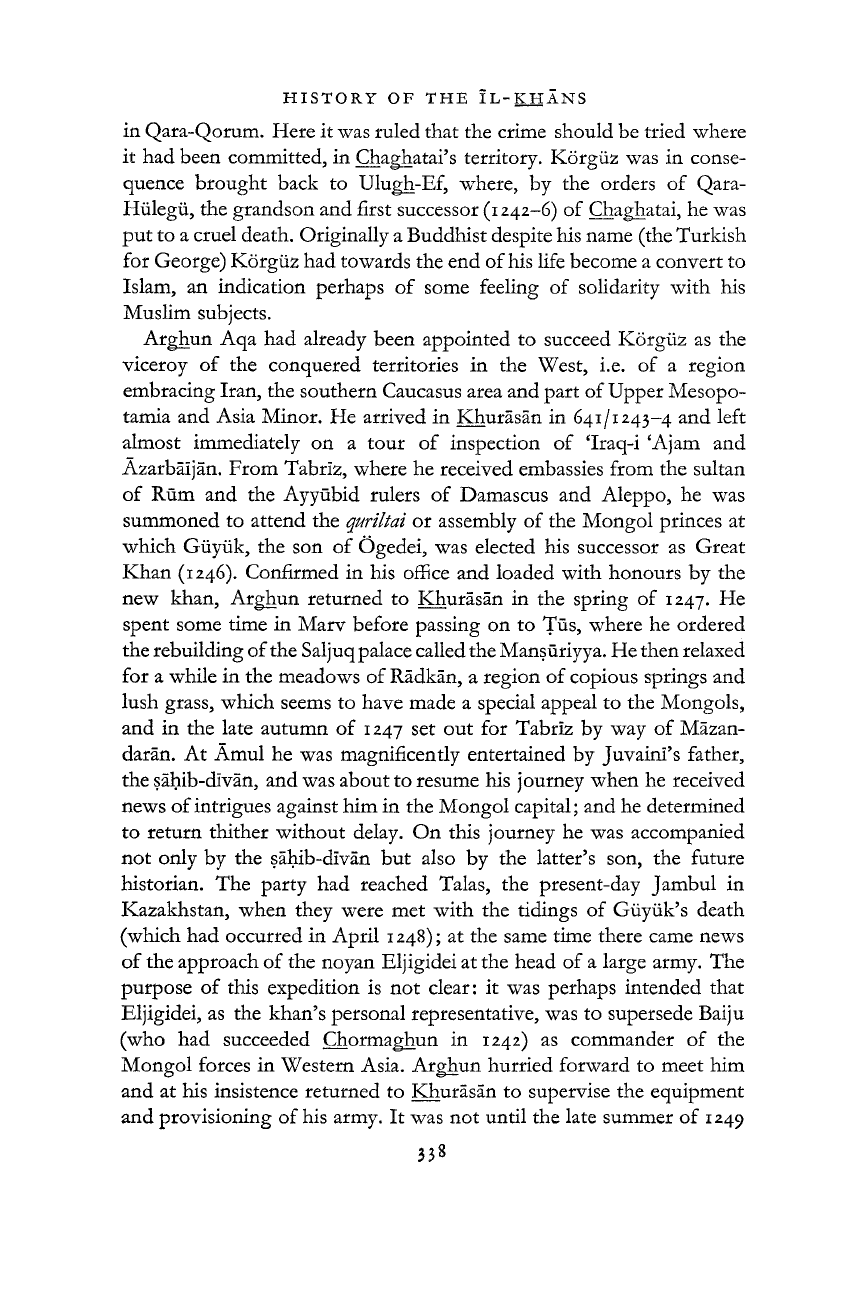
HISTORY OF THE IL- KHANS
338
in Qara-Qorum. Here it was ruled that the crime should be tried where
it had been committed, in Cha
ghatai's territory. Korgiiz was in conse-
quence brought back to Ulugh-Ef, where, by the orders of Qara-
Hiilegu, the grandson and first successor
(1242-6)
of Chaghatai, he was
put to a cruel death. Originally a Buddhist despite his name (the Turkish
for George) Korgiiz had towards the end of his life become a convert to
Islam, an indication perhaps of some feeling of solidarity with his
Muslim subjects.
Arghun Aqa had already been appointed to succeed Korgiiz as the
viceroy of the conquered territories in the West, i.e. of a region
embracing Iran, the southern Caucasus area and part of Upper Mesopo-
tamia and Asia Minor. He arrived in Khurasan in
641/1243-4
and left
almost immediately on a tour of inspection of 'Iraq-i 'Ajam and
Azarbaijan. From Tabriz, where he received embassies from the sultan
of Rum and the Ayyubid rulers of Damascus and Aleppo, he was
summoned to attend the quriltai or assembly of the Mongol princes at
which Giiyiik, the son of Ogedei, was elected his successor as Great
Khan
(1246). Confirmed in his office and loaded with honours by the
new khan, Ar
ghun returned to Khurasan in the spring of
1247.
He
spent some time in Marv before passing on to Tus, where he ordered
the rebuilding of the Saljuq palace called the Mansuriyya. He then relaxed
for a while in the meadows of Radkan, a region of copious springs and
lush grass, which seems to have made a special appeal to the Mongols,
and in the late autumn of
1247
set out for Tabriz by way of Mazan-
daran. At Amul he was magnificently entertained by Juvaini's father,
the sahib-divan, and was about to resume his journey when he received
news of intrigues against him in the Mongol capital; and he determined
to return thither without delay. On this journey he was accompanied
not only by the sahib-divan but also by the latter's son, the future
historian. The party had reached Talas, the present-day Jambul in
Kazakhstan, when they were met with the tidings of Giiyuk's death
(which had occurred in April
1248); at the same time there came news
of the approach of the noyan Eljigidei at the head of a large army. The
purpose of this expedition is not clear: it was perhaps intended that
Eljigidei, as the khan's personal representative, was to supersede Baiju
(who had succeeded Chorma
ghun in
1242)
as commander of the
Mongol forces in Western Asia. Ar
ghun hurried forward to meet him
and at his insistence returned to
Khurasan to supervise the equipment
and provisioning of his army. It was not until the late summer of
1249
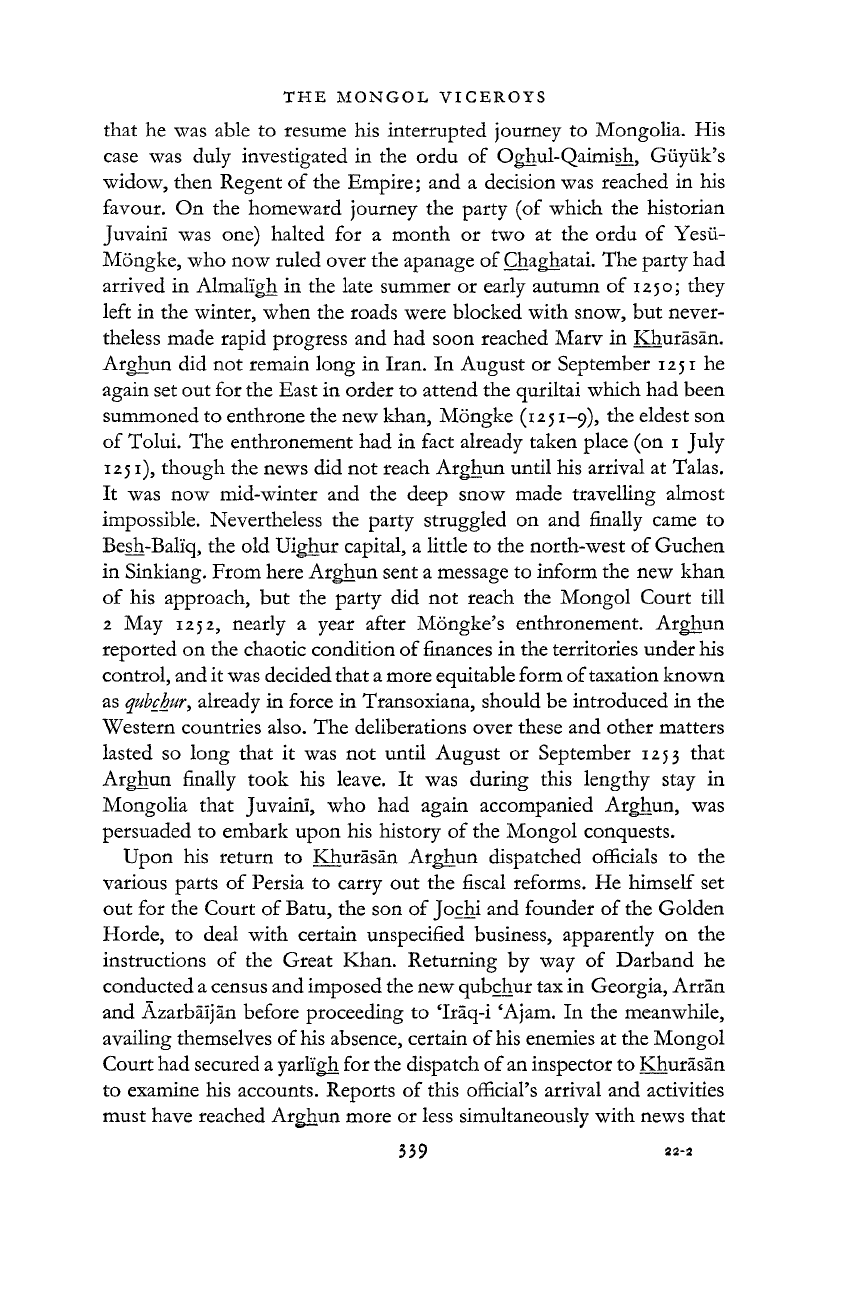
THE MONGOL VICEROYS
that he was able to resume his interrupted journey to Mongolia. His
case was duly investigated in the ordu of Oghul-Qaimish, Guyuk's
widow, then Regent of the Empire; and a decision was reached in his
favour. On the homeward journey the party (of which the historian
Juvaini was one) halted for a month or two at the ordu of Yesii-
Mongke, who now ruled over the apanage of Cha
ghatai. The party had
arrived in Almaligh in the late summer or early autumn of
1250;
they
left in the winter, when the roads were blocked with snow, but never-
theless made rapid progress and had soon reached Marv in Khurasan.
Arghun did not remain long in Iran. In August or September
1251
he
again set out for the East in order to attend the quriltai which had been
summoned to enthrone the new khan, Mongke
(1251-9),
the eldest son
of Tolui. The enthronement had in fact already taken place (on 1 July
1251),
though the news did not reach Arghun until his arrival at Talas.
It was now mid-winter and the deep snow made travelling almost
impossible. Nevertheless the party struggled on and finally came to
Besh-Baliq, the old Ui
ghur capital, a little to the north-west of Guchen
in Sinkiang. From here Ar
ghun sent a message to inform the new khan
of his approach, but the party did not reach the Mongol Court till
2
May
1252,
nearly a year after Mongke's enthronement. Arghun
reported on the chaotic condition of finances in the territories under his
control, and it was decided that a more equitable form of taxation known
as
qubchur,
already in force in Transoxiana, should be introduced in the
Western countries also. The deliberations over these and other matters
lasted so long that it was not until August or September
1253
that
Ar
ghun finally took his leave. It was during this lengthy stay in
Mongolia that Juvaini, who had again accompanied Ar
ghun, was
persuaded to embark upon his history of the Mongol conquests.
Upon his return to Khurasan Arghun dispatched officials to the
various parts of Persia to carry out the fiscal reforms. He himself set
out for the Court of Batu, the son of Jochi and founder of the Golden
Horde,
to deal with certain unspecified business, apparently on the
instructions of the Great Khan. Returning by way of Darband he
conducted a census and imposed the new qubchur tax in Georgia, Arran
and Azarbaijan before proceeding to
c
Iraq-i 'Ajam. In the meanwhile,
availing themselves of his absence, certain of his enemies at the Mongol
Court had secured a yarli
gh for the dispatch of an inspector to Khurasan
to examine his accounts. Reports of this official's arrival and activities
must have reached Ar
ghun more or less simultaneously with news that
339 22-2
